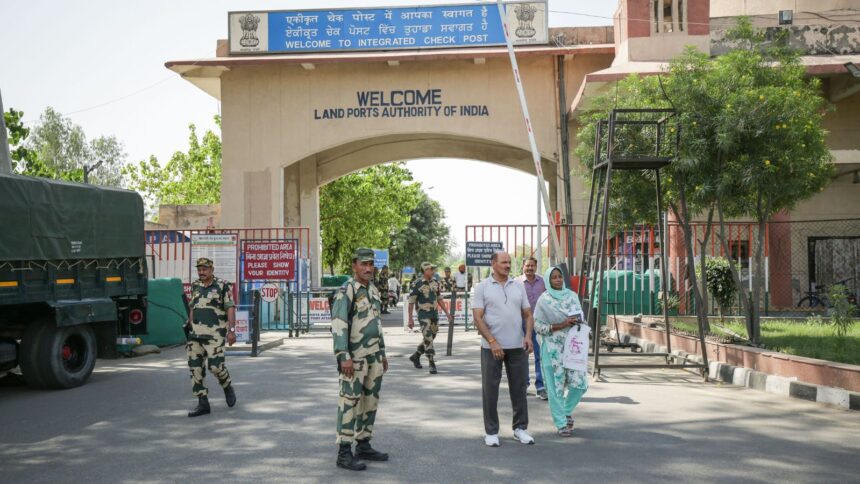India’s decision to close the Integrated Check Post (ICP) at, in the wake of the Pahalgam terror attack, is set to halt cross-border trade worth Rs 3,886.53 crore between India and Pakistan. Bilateral trade had already been in decline since India imposed a 200 per cent duty on Pakistani goods in 2019, following the Pulwama terrorist attack, data from the Land Ports Authority of India shows.
According to official data, India exported items such as soya bean, poultry feed, vegetables, red chillies, plastic granules, and plastic yarn, while importing goods including dry fruits, dates, gypsum, cement, glass, rock salt, and herbs from Pakistan via the Land Port at Attari. The port, spread over 120 acres, assumes significance since it has direct access to National Highway 1.
Tensions between the two countries — particularly following the Pulwama attack — reduced trade between India and Pakistan from Rs 4,370.78 crore in 2018–19 to Rs 2,257.55 crore in 2022–23. However, trade rebounded to Rs 3,886.53 crore in 2023–24, the highest in the past five years. Notably, total cargo movement also dropped from 49,102 consignments in 2018–19 to just 3,827 in 2022–23, the data shows.
In dollar terms, total India-Pakistan trade has shrunk to about $2 billion annually over the past five years, a small fraction of the $37 billion trade potential estimated by the World Bank. India’s overall goods trade stands at $430 billion, while Pakistan’s is approximately $100 billion.
The aid-dependent Pakistani economy has also faced recurring bouts of high following the pandemic and widespread social unrest. In May last year, violent street protests in Pakistan-occupied Kashmir (PoK) left one police officer dead and over 90 injured, according to Pakistani media reports.
The violence erupted after around 70 members of the Joint Awami Action Committee—a traders’ organisation—were arrested during a strike protesting against the rising costs of food, fuel, and utilities. The economic crisis and inflation in Pakistan have created hardships for its citizens, with some traders further affected by the cessation of trade with India.
Additionally, the International Monetary Fund (IMF) on Tuesday revised Pakistan’s growth forecast downwards to 2.6 per cent, citing the impact of US tariffs, — now at 100-year highs — and warning that increasing global trade tensions would further hamper growth.
Trade experts noted that India-Pakistan trade via the Attari border had created a significant economic ecosystem in Punjab, particularly in and around Amritsar as well as Attari. The trade provided direct and indirect employment to thousands, including transporters, porters, shopkeepers, and workers in related industries.
A number of political parties particularly the Congress, the Shiromani Akali Dal and had demanded opening trade via the ICP during the last few years due to demands by traders in Punjab and nearby areas.
However, trade is often the first casualty when tensions escalate between India and Pakistan, and the Wagah-Attari land route is no exception, the -based Centre for Research in Rural and Industrial Development (CRRID) said in a research report.

“Although trade restrictions adversely affect all stakeholders in India involved in Indo-Pakistan trade, the impact is far more severe in Punjab, as most of the trade through this route originates from the state, along with some from neighbouring north-western states,” the report noted.
Straw reapers and cotton yarn are among the major export items from Indian Punjab via the Wagah–Attari land route.
“Straw reapers, manufactured by various small-scale units in Punjab, are a significant export to Pakistan through the ICP at Attari. Between 2016–17 and 2018–19, the number of straw reapers exported ranged from 846 to 1,110 units, with export earnings between Rs 1,844 lakh and Rs 2,488 lakh,” the report said.
“Due to trade restrictions, exports of straw reapers dropped to 100 units in 2019–20, with earnings falling to Rs 232 lakh. Exporters had expected to ship 2,441 straw reapers to Pakistan in 2020–21 under normal trade conditions, which could have generated Rs 6,195 lakh in revenue,” the report added.
The Attari-Wagah land route was first opened in 2005 and truck movement on this route began in 2007. The ICP at Attari was inaugurated on April 13, 2012, under the UPA government, with provisions of facilities for fast and cost-effective land trade.








